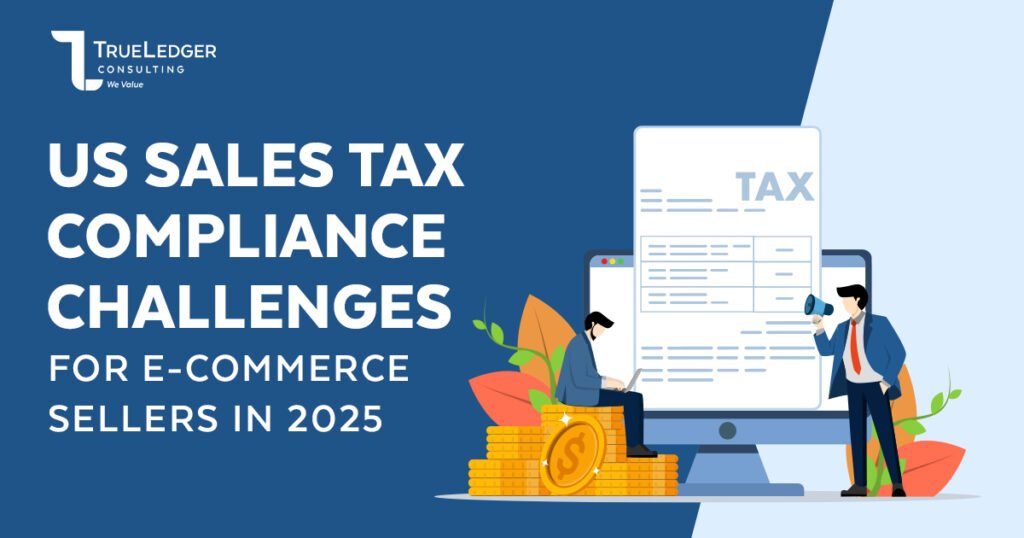
US Sales Tax Compliance Challenges for E-Commerce Sellers in 2025
In 2025, US sales tax compliance continues to be one of the most pressing challenges for e-commerce sellers across the United States. With the rapid growth of online retail and evolving state tax regulations, businesses that once operated freely across state lines now face a maze of legal and administrative hurdles. Understanding and managing your sales tax obligations is not just a matter of best practices—it’s essential for staying audit-ready, avoiding penalties, and maintaining financial clarity.

🧭 Understanding Nexus in a Post-Wayfair World
The 2018 Supreme Court ruling in South Dakota v. Wayfair fundamentally changed the landscape of sales tax compliance. No longer are online sellers required to have a physical presence in a state to be responsible for collecting and remitting taxes. Instead, economic nexus laws now determine tax obligations based on a seller’s sales volume or number of transactions within a state.
Each state sets its own threshold. For example:
- South Dakota: $100,000 in sales or 200 transactions.
- California: $500,000 in sales with no transaction threshold.
- Texas: $500,000 in sal
Failing to monitor these thresholds can lead to unintentional non-compliance. Many e-commerce businesses are unaware they’ve triggered nexus in multiple states, leading to back taxes and steep penalties. The key is to track economic nexus thresholds consistently and register in states before crossing compliance lines.
📍 The Complexity of Local Sales Tax Rates
Another common pain point for sellers is the assumption that sales tax rates are uniform across a state. In reality, there are over 11,000 tax jurisdictions in the U.S., and local tax rates vary dramatically by city, county, and even district.
Take California, for instance:
- Base state rate: 7.25%
- With local taxes: Up to 10.25% in some cities
Or Colorado, where cities can opt out of state collection systems entirely, making manual calculations a nightmare. If your business charges the wrong rate, you risk either:
- Overcharging customers (damaging trust and conversions), or
- Under-collecting tax (leading to liabilities during audits)
Using automation and APIs that update sales tax rates by ZIP code is no longer optional—it’s essential.
🛍️ Marketplace Facilitator Laws & Multi-Channel Confusion
With platforms like Amazon, eBay, Etsy, and Walmart Marketplace dominating the online retail space, marketplace facilitator laws have shifted the tax collection burden. In most states, these platforms are now required to collect and remit tax on behalf of their sellers.
Sounds simple, right? Not always.
Many sellers also run Shopify, WooCommerce, or direct-to-consumer stores where they are responsible for collecting tax. Confusion arises when:
- Sellers double report taxes already collected by marketplaces.
- Sellers fail to collect on non-marketplace sales, assuming all sales are covered.
This fragmented approach can lead to inconsistent filings and higher audit risks. State tax authorities now cross-reference sales reported by platforms with sellers’ tax returns, so any mismatch can raise red flags.
💻 Taxability of Digital Goods & SaaS Products
One of the most overlooked areas of sales tax compliance is the taxability of digital products and SaaS (Software as a Service). Each state has its own rules about whether ebooks, streaming subscriptions, downloadable content, or cloud software are considered taxable.
Examples:
- New York and Texas: Tax most digital goods and SaaS
- California and Florida: Do not tax digital downloads
Misclassifying these products can lead to overcharging tax (losing price competitiveness) or under-collection (creating audit exposure). Sellers must carefully map their product catalog to the correct sales tax categories in every state where they have nexus.
⏰ Missed Deadlines & Filing Penalties
Even if you collect the right amount of tax, failing to file your returns on time can result in automatic penalties. States like Florida charge $50 per missed return—even if no tax is owed.
Some states also require prepayments or estimated payments based on historical sales volume, further complicating filing schedules. And if you’re registered in multiple states, keeping track of different monthly, quarterly, and annual due dates is a full-time job in itself.
A missed return can:
- Trigger notices and late fees
- Flag your business for further audit
- Disrupt cash flow due to unexpected liabilities
🔄 The Need for Sales Tax Reconciliation in E-Commerce Accounting
For e-commerce accountants and business owners, the biggest hidden challenge is reconciling sales tax collected with what’s recorded in your books. With multiple platforms (Amazon, Shopify, PayPal, Stripe), payouts don’t always align with sales recorded in QuickBooks Online or Xero.
Common problems include:
- Gross sales don’t match platform reports
- Refunds and chargebacks aren’t allocated correctly
- Sales tax collected differs from what’s reported in accounting software
This leads to misstated financials, higher audit risks, and potential cash flow issues.
🤖 How to Stay Compliant in 2025: Tools & Technology
In 2025, staying compliant requires more than spreadsheets and guesswork. Top-performing businesses are leveraging sales tax automation tools to manage calculations, filings, and data syncs across platforms.
Here are leading tools for e-commerce tax automation:
- TaxJar: Great for small to mid-sized sellers
- Avalara: Robust for real-time rate calculation and filing
- Vertex & Sovos: Enterprise-grade tools for large operations
- A2X, Dext Commerce, Synder: Help reconcile marketplace sales into QBO/Xero with accuracy
The key is to automate what’s repeatable and outsource what’s risky.
Final Thoughts: Work with Sales Tax Experts
At True Ledger Consulting, we specialize in helping e-commerce sellers navigate the complex world of multi-state sales tax compliance. Whether you’re just getting started with economic nexus or facing audit risk from legacy non-compliance, we offer full-service sales tax automation, registration, reconciliation, and filing support.
Need help with sales tax compliance in 2025?
Our experts can help you automate, optimize, and stay audit-ready.
👉 Contact us today or schedule a discovery call to discuss your e-commerce tax needs.
